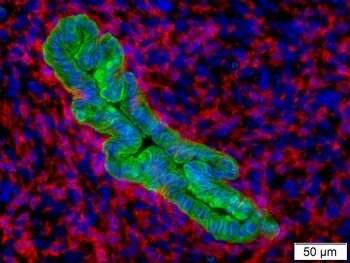
Individuals diagnosed with intrahepatic cholangiocarcinoma (iCCA), a type of liver cancer, face a five-year survival rate of less than 10 percent. But a Wilmot Cancer Institute team that also investigates pancreatic cancer, which has similarly poor survival statistics, discovered factors that both aggressive cancers have in common. Scientists believe the new data provide a roadmap for targeting the tumors with immune therapies.
In a recent publication in the journal Gut, the team showed that iCCA tumors are comprised of a dense network of cells that are non-cancerous and yet help to create an environment that’s ripe for cancer’s growth and spread. Called TAMs (tumor-associated macrophages), these same cells also play a sinister role in pancreatic cancer.
The TAMs create an inflammatory barrier around cancer cells that block the body’s natural disease fighters (such as T cells) from destroying the cancer. Patients with iCCA whose tumors are infiltrated with TAMs have a poorer prognosis, the paper stated. First author is Luis Ruffolo, M.D., a surgical resident at URMC.
Researchers also developed new laboratory methods to advance the studies, which are led by David Linehan, M.D., chief of clinical operations at Wilmot and the Seymour I Schwartz Professor and chair of Surgery at the University of Rochester Medical Center.
Linehan and collaborators have been investigating TAMs for many years and are working on combinations of therapies that can break through the juggernaut of resistance. The latest paper lays out how TAMs are recruited to the tumor site; it also demonstrates in mice that blocking those recruitment pathways depletes TAMs and allows T cells to activate against iCCA.
Source: Read Full Article
